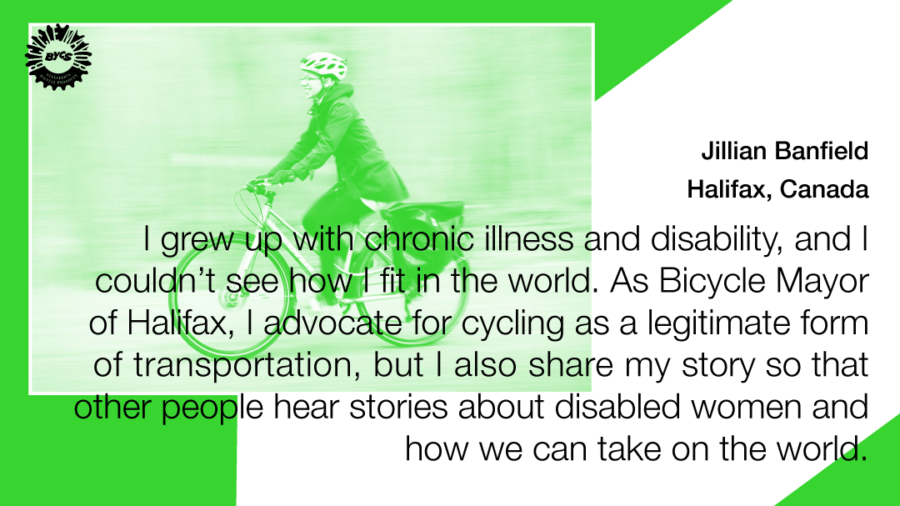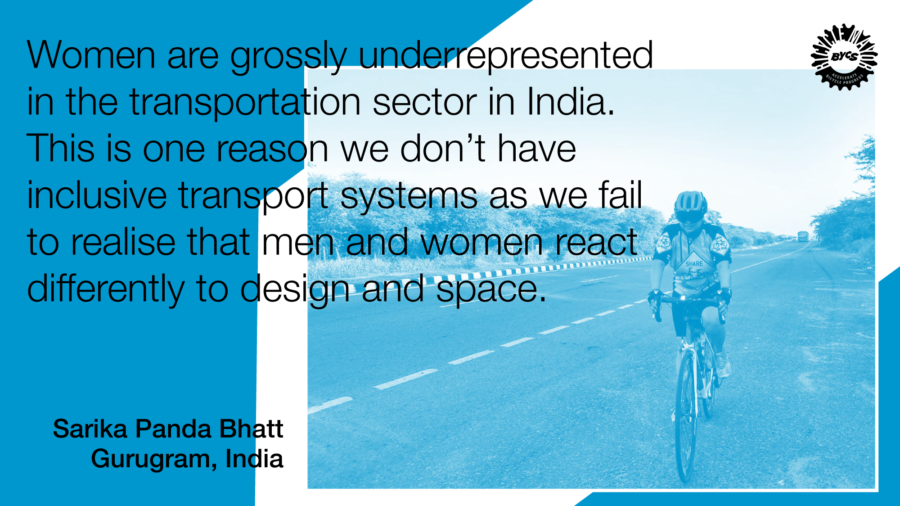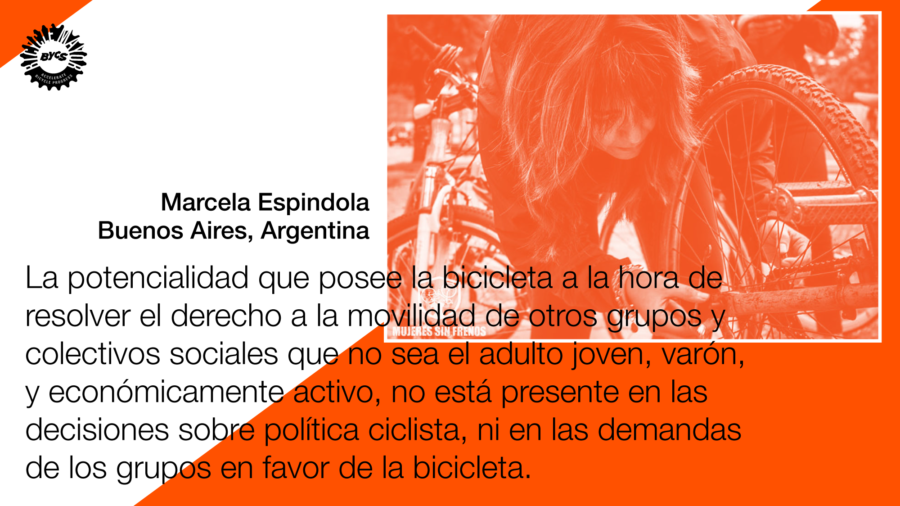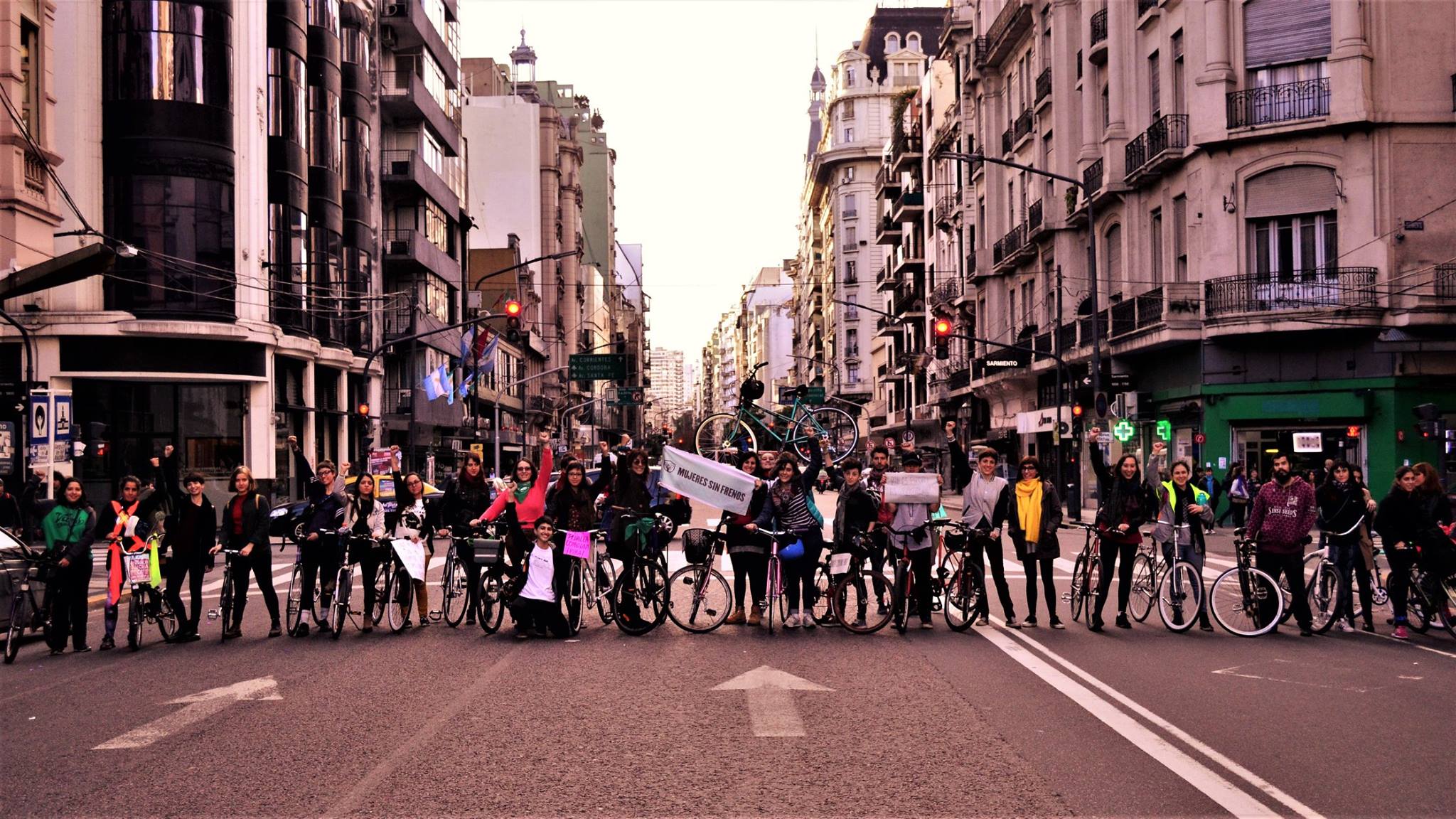March 8th, 2021
To mark International Women’s Day 2021, we asked women Bicycle Mayors from 12 cities around the world what the UN’s theme “Women in leadership: Achieving an equal future in a COVID-19 world” meant to them.
Access the thread here and read their full responses below:
Pooja Vijay, Jaipur, India:
“We live in a world where the lives and contributions of men are valued more than those of women, and gender norms and binaries really reinforce that. Gender equality means fighting for all of us so we don’t exclude anyone from having the right to exist and identify in their own beautiful way. For me, gender equity would mean that we undo all of those cultural norms and policies and systems that maintain that hierarchy and replace them with new narratives, new norms, and new policies that uplift everyone’s ability to live well. Being a leader myself, I have realized that females have the power to bring change in the entire society. I feel if I can convince the female of the family to ride a cycle then it becomes quite simple to convince the entire family to start pedalling. So bringing females on cycles will not just be a challenge but it will be more than a movement for humanity. It’s about undoing all of the hierarchies of power privilege that dehumanise us. What will define us is that we will be a driving force to a more humane economy and democracy for everyone.”
Donna Cooney, Dublin, Ireland:
“Being a leader for me feels like an honour, to be able from a grassroots level to bring people with you locally and nationally to effect positive change in people’s daily lives. As a long time advocate I’ve worked to influence change at all levels, influencing leaders and communities to invest and support safe cycling and active transport. I truly believe in the power of the bicycle and women on bicycles to transform our communities and our world.
This year has been a challenge for so many and yet there have also been opportunities to bring about transformative change, in Dublin City we are implementing 145 km of cycling infrastructure over the next five years, with an investment of 50 million euro in Dublin City this year. I could never have dreamt of this change happening so quickly and I feel so lucky to be a leader for this change. What is really special is to see so many more women of all ages on their bicycles #FreedomMachine and to feel that I helped to make this happen, that to me success as a leader and I’m happy that I have helped pass on a better safer world to my daughters and inspire all young women to be the future leaders”
Priya Bhattacharji, Meerut Cantt, India
“I hope it means stepping away from the need to prove one’s worth in a ‘man’s world’. Now is a great time to re-examine the importance of traditionally ‘feminine’ work. In a place like India, female healthcare workers, local artisans , care-givers , farm workers, elementary school teachers , front-desk staff make for a significantly invisible workforce. The dignity, working conditions, and pay of such jobs demands quantum change.”
Ana Carboni, Niterói, Brazil
“The challenge for me here would be not only as a woman leader in a very male dominated environment, but stepping out of the limelight, giving support to women from historically underrepresented groups. Women that in Brazil (still) do not have the same opportunities as me. They have much greater mobility challenges than I and know what they need. That is why I have been trying to listen more than talk.”
Jillian Banfield, Halifax, Canada:
“Growing up, I didn’t know any disabled women, and didn’t see them in popular media. I grew up with chronic illness and disability, and I couldn’t see how I fit in the world. As Bicycle Mayor of Halifax, I advocate for cycling as a legitimate form of transportation, but I also share my story so that other people hear stories about disabled women and how we can take on the world.”

Ana Pereira, Lisbon, Portugal:
“It means a world where women have better choices and more, and better opportunities.
A world where women’s ideas are voiced and heard as often as men’s. A world where women (all ethnicities and social classes, ability / disability levels) are represented in opinion making forums, in leadership positions in business, politics, media, culture, film, etc. A world where caring for children, the sick and the elderly is a government supported responsibility of both men and women. And caring for the home and for domestic life is also shared equally between men and women. A world with safe streets and safe public transport, where women’s fruition of public space and visibility in said public space, is not hindered by fear of sexual harassment / gender violence. A world where women’s mobility, and all carers’ mobility, is at least as subsidised, safe, comfortable and fast as men’s commuting mobility is today. A world where both houses and cities are designed with women and carer’s needs in mind (representativity, again, here in architecture and urbanism). A world where women are not paid less than men for the same jobs and skills.
Women cannot advance their lives, their health, their friendships, their education, their jobs prospects and their careers, and their personal endeavours, and participate in public life if their time is consumed in caring for other people, and in getting around in inefficient ways, and if their income is cut to benefit men’s.”
Marina Kyriakou, Nicosia, Cyprus:
“Active contribution of women in the future actions for all sectors can ensure equal opportunities and equal rights for everyone. Covid-19 has impacted the society at multiple levels and there should be no space for gender discrimination in shaping tomorrow’s society.
My country has been affected by the Covid-19 in an unprecedented way, and the impacts do not distinguish borders, race or gender. Women have different needs, characteristics, responsibilities and outlook than men. More women should take the lead in the transition to a fair post-covid society!”
Sarika Panda Bhatt, Gurugram, India:
“Today and every day, I take pride in being a woman and that too in the transport space. Women are grossly underrepresented in the transportation sector in India. This is one reason we don’t have inclusive transport systems as we fail to realise that men and women react differently to design and space.
COVID pandemic has radically changed our travel habits. It is also the reason important but grossly neglected modes like cycle are making a comeback. Therefore, as we plan for life after COVID, it is important to imagine a world that offers an equal future. One thing to do would be to bring more women into the transport space and give more priority to bicycles as part of our mobility mix.”

Viviane Zampieri, Rio de Janeiro, Brazil:
“In many contexts and / or realities, the bicycle is more than female empowerment, it is synonymous with freedom, independence, conquest of spaces. Given that there are some needy populations where women are the only source of income, I understand that the bicycle is a game changer. On International Women’s Day, I can say that the use of the bicycle by women has countless achievements but unfortunately we still have barriers along the way.”
İnci Şenay Güneş, Istanbul, Turkey:
“Being a woman in every field requires being strong, but being a woman on a bicycle and a woman Bicycle Mayor shows that women are not alone. I feel strong together.”
Mariana Salvador, Santa Fe, Argentina
Ser lideresa y madre en mi comunidad siempre implicó un gran desafío y fundamentalmente en tiempos de COVID, situación que nos obligó a regresar al hogar con mayor presencia y permanencia, lugar donde históricamente se nos condenó a cumplir tareas no retribuidas e invisibilizadas que fueron y son parte del sostén del sistema capitalista.
Ser lideresa y madre en mi comunidad implica también dar una constante batalla al estilo “star wars”; no sólo a los obstáculos que se nos presentan en la calle día a día, sino a los de índole patriarcal: que en los espacios de movilidad consideren nuestra opinión, que tengamos el apoyo de la familia, que se distribuyan las tareas de cuidado en el hogar y que tengamos un trabajo bien pago para poder dedicarnos al activismo.
Para construir un futuro igualitario necesitamos replantearnos todos los nichos de contención patriarcal; la familia, la escuela, los medios de comunicación, la calle, la movilidad y un sin fin de otros.
A su vez nuestra lucha pionera abre caminos a nuevas lideresas, facilitandoles el camino, encontrando entre todas una red de contención y experiencia que fortalece los nuevos liderazgos.
Marcela Espindola, Buenos Aires, Argentina
En la mayoría de las grandes ciudades latinoamericanas se está registrando un aumento sostenido de personas que adoptaron la bicicleta como forma de movilidad cotidiana. El recelo al transporte colectivo tras el período de confinamiento nos plantea un gran desafío a quienes creemos en la bicicleta como una alternativa viable y sostenible para la adaptación y resiliencia de las ciudades. Es necesario pensar en un sistema integrado intermodal, rápido y accesible para quienes quieren reducir distancias, mejorar su salud, bajar las horas de exposición en aglomeraciones públicas, y contribuir con el ambiente en la ciudad. La bicicleta debe pensarse integrada a ese sistema, en el que gobiernos y organizaciones sociales locales trabajen fuertemente para mejorar las condiciones de infraestructura, normativa, regulaciones, etc, para quienes son los más vulnerables del tránsito.
La potencialidad que posee la bicicleta a la hora de resolver el derecho a la movilidad de otros grupos y colectivos sociales que no sea el adulto joven, varón, y económicamente activo, no está presente en las decisiones sobre política ciclista, ni en las demandas de los grupos en favor de la bicicleta.
Creo que es una gran oportunidad para pensar en políticas locales que mejoren la accesibilidad de mujeres, niñes, adultos mayores, y personas con discapacidad, que ven actualmente a las grandes ciudades como un espacio de inseguridad y miedo.
El momento de la igualdad ¡es ahora!


